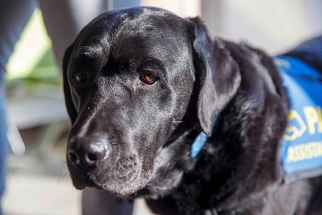Paw and order Victim Services' accredited 'facility dog' comforts children navigating justice system
Read this article for free:
or
Already have an account? Log in here »
To continue reading, please subscribe:
Monthly Digital Subscription
$0 for the first 4 weeks*
- Enjoy unlimited reading on winnipegfreepress.com
- Read the E-Edition, our digital replica newspaper
- Access News Break, our award-winning app
- Play interactive puzzles
*No charge for 4 weeks then price increases to the regular rate of $19.00 plus GST every four weeks. Offer available to new and qualified returning subscribers only. Cancel any time.
Monthly Digital Subscription
$4.75/week*
- Enjoy unlimited reading on winnipegfreepress.com
- Read the E-Edition, our digital replica newspaper
- Access News Break, our award-winning app
- Play interactive puzzles
*Billed as $19 plus GST every four weeks. Cancel any time.
To continue reading, please subscribe:
Add Free Press access to your Brandon Sun subscription for only an additional
$1 for the first 4 weeks*
*Your next subscription payment will increase by $1.00 and you will be charged $16.99 plus GST for four weeks. After four weeks, your payment will increase to $23.99 plus GST every four weeks.
Read unlimited articles for free today:
or
Already have an account? Log in here »
Hey there, time traveller!
This article was published 24/02/2020 (2121 days ago), so information in it may no longer be current.
When children who are victims of crime have to testify in court in Winnipeg, they don’t have to take the stand alone.
Milan, a black Labrador retriever with knowing eyes and a calm demeanour, has become an integral part of the Manitoba Justice Victim Services department since being hired in 2016. She is the province’s first and only accredited facility dog and her job is to support children and youth — many of whom are victims of sexual offences — while they navigate the justice system.
To date, she has provided support in more than 100 court cases.
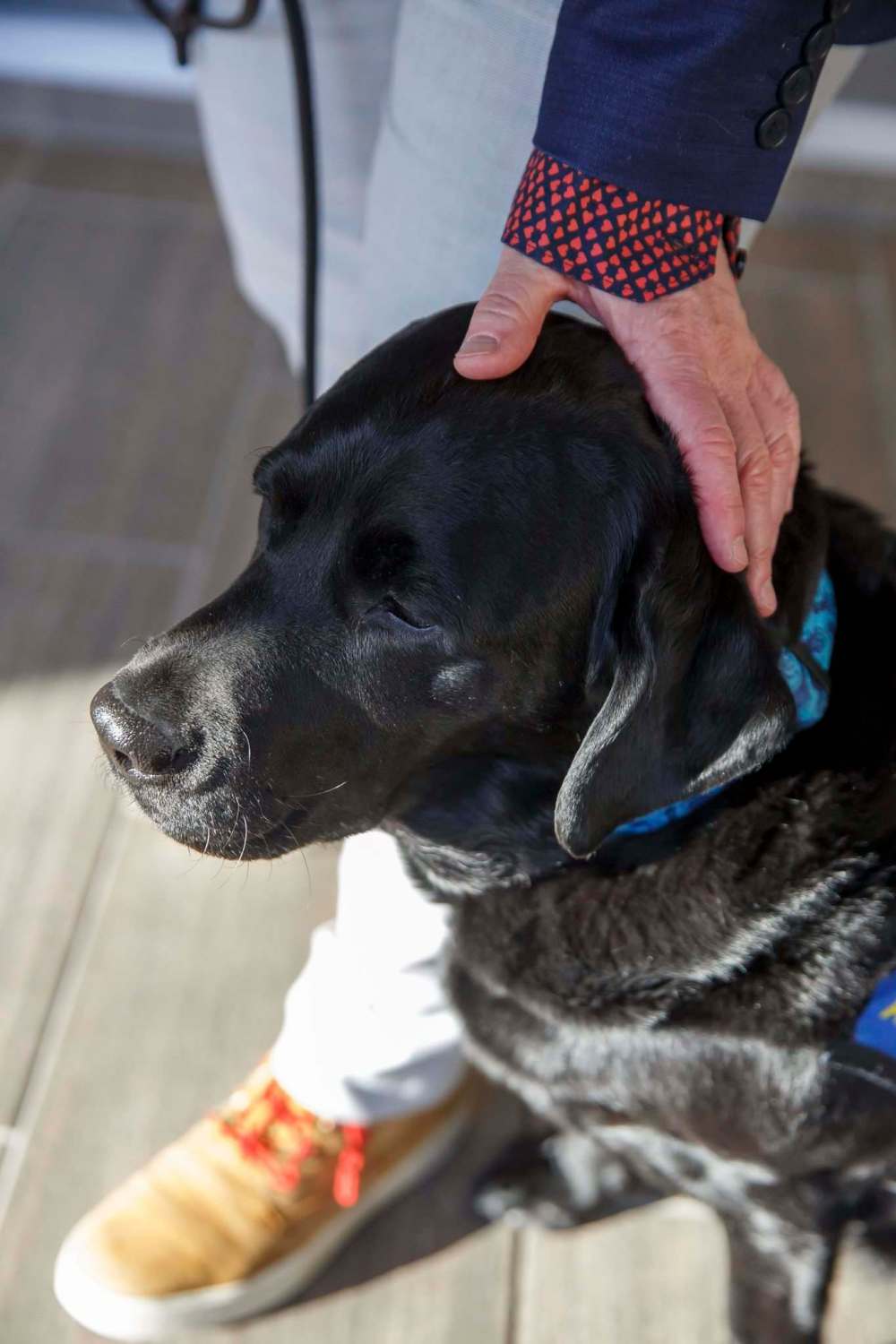
“Her purpose is to help us normalize the court procedure for people,” says Vivian Bott, a victim services worker and Milan’s primary handler. “She breaks down barriers, she builds bridges with people, she calms people down.”
The pair work and live together full time. Bott’s office in the Woodsworth Building on Broadway is outfitted with a dog bed full of stuffed animals where Milan can rest while Bott works on the computer. Their weekly routine includes anything from court preparation and client meetings to trial appearances.
Milan doesn’t have to do much to have an impact — her presence in nondescript boardrooms and austere courtrooms is often enough.
“There’s like a storm of emotions people have coming into this building because they know why they’re coming here,” Bott says, adding that the six-year-old Lab has an innate ability to suss out who needs help regulating those emotions.
“I bring her into a group of people and she will just go to whoever needs her. Sometimes it’s the kid, sometimes it’s the parent because they’re angry that this awful thing has happened to their kid.”
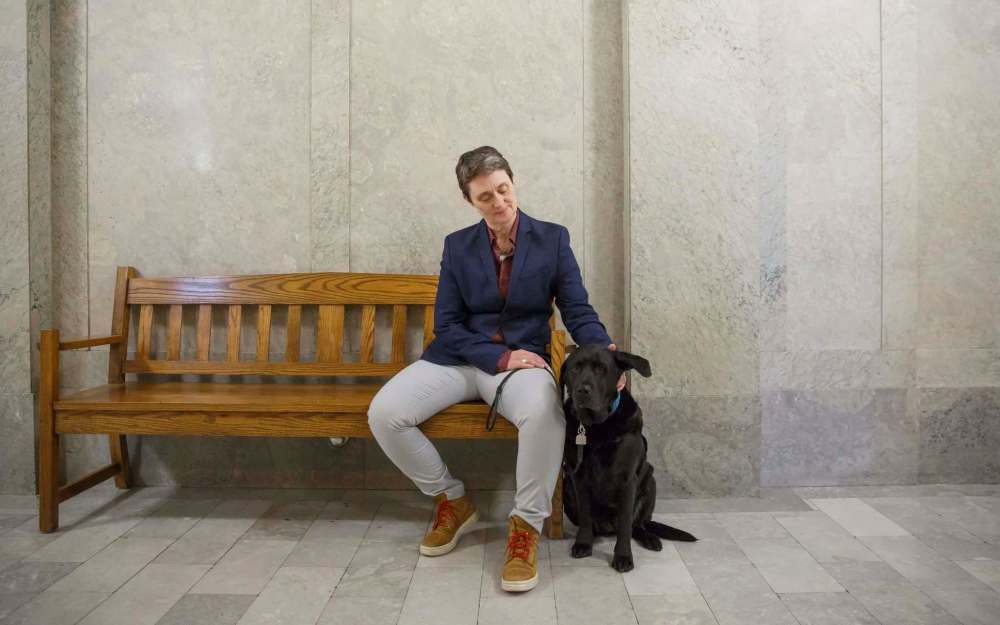
When she’s wearing her blue-and-yellow work vest, Milan’s signature move is to approach whoever is in distress and sit on their feet — a courtesy she has extended to staff, police officers, judges and passersby in the halls of the Law Courts.
During court proceedings, she will join children on the stand, within petting distance, and provide physical comfort in difficult moments.
“I can talk to people all day long and I can give them supportive comforting words, but I can’t go up to my client and touch them or offer any kind of physical comfort to them. But they can get that from her,” Bott says.
The difference Milan has made within the Victim Services department has been profound, not only as a tool to connect with clients, but also as a morale booster in the office.
“I think she’s been a valuable addition to our team at Victim Services, not just for the clients we work with, but even for the staff. Working with a dog in the office is just an incredibly rewarding experience,” says Ann Desautels, Milan’s alternate handler.
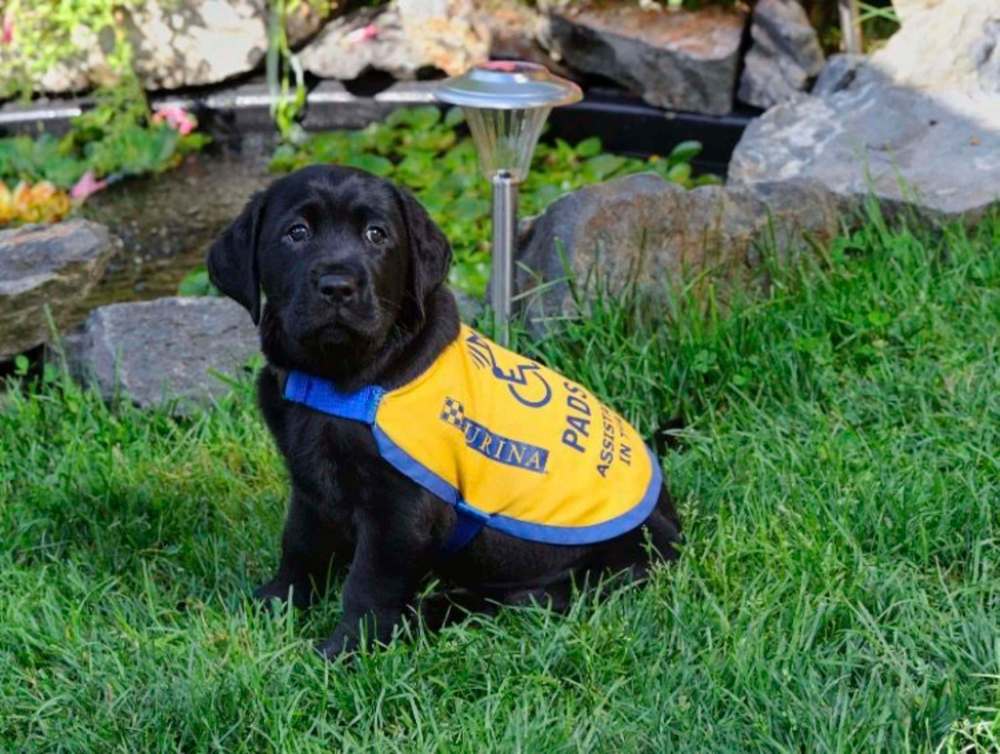
To become handlers, Desautels and Bott both went through an intensive training program to learn how to command Milan, who is a graduate of the Pacific Assistance Dogs Society (PADS).
The non-profit organization has been running in Burnaby, B.C., for 33 years and specializes in raising and training accredited facility dogs, and service dogs for clients with mobility issues, hearing loss and post-traumatic stress disorder. Unlike general therapy dogs, facility dogs, like Milan, are specially trained to provide physical, social or emotional support to those in the justice, education and health-care systems.
“We’re looking for dogs that have that natural affinity for people, that are drawn to people when they are upset,” says Tara Doherty, communications officer with PADS. “But even more importantly, we’re looking for dogs that have a really nice resilience… the ability to do that type of work and keep coming back for more without it taking a real toll on them.
“Similar to people, not everyone is suited to work in a victim-services type of role.”
Doherty says there are about 180 dogs in PADS’ two-year training program at any given time; only about half graduate to a work placement. The remainder, while not suited for a career in service work, are adopted as pets by families with children with disabilities.
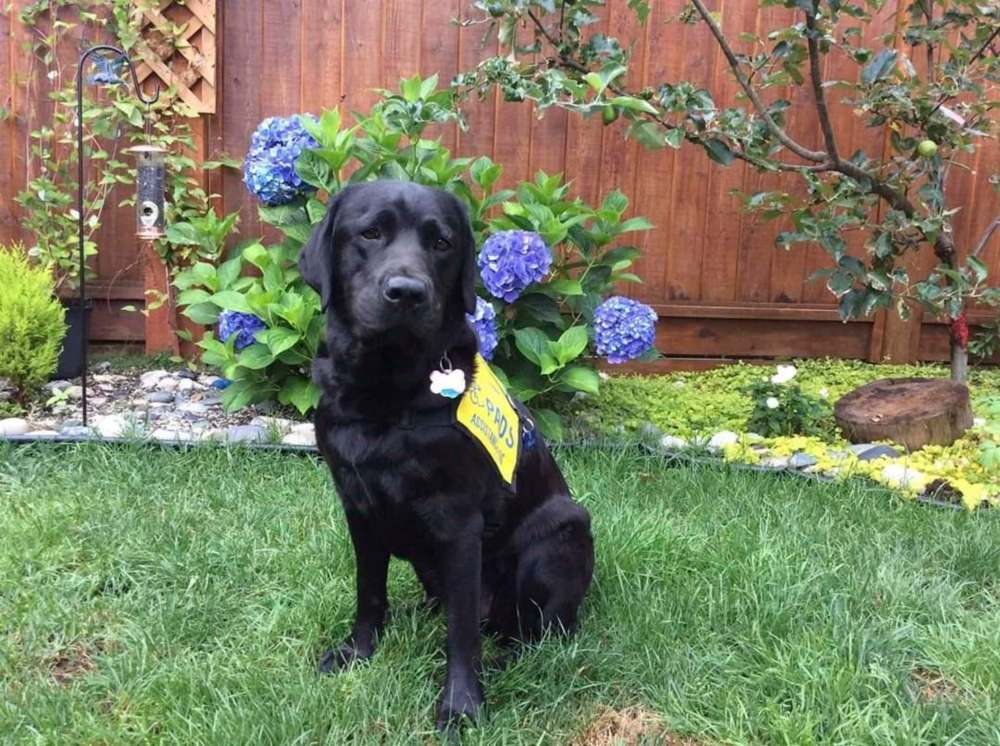
The organization retains ownership of its dogs throughout their working lives and covers the cost of breeding, training, placement, follow-ups and support during that time. The average cost of each animal from birth to retirement is about $35,000.
Bott, a 16-year veteran of the department, is planning to adopt Milan when she retires from Victim Services, but for now the relationship has to remain professional.
“I don’t own her, she’s not my pet. She’s my work partner first,” she says. “When we retire she’ll be my pet all the time.”
Bott was matched with Milan in 2016 and went through a week of training that included a written and practical test in Burnaby before she could bring the dog home. The pair is required to complete a recertification test annually.
The new partnership took some getting used to in the early days.
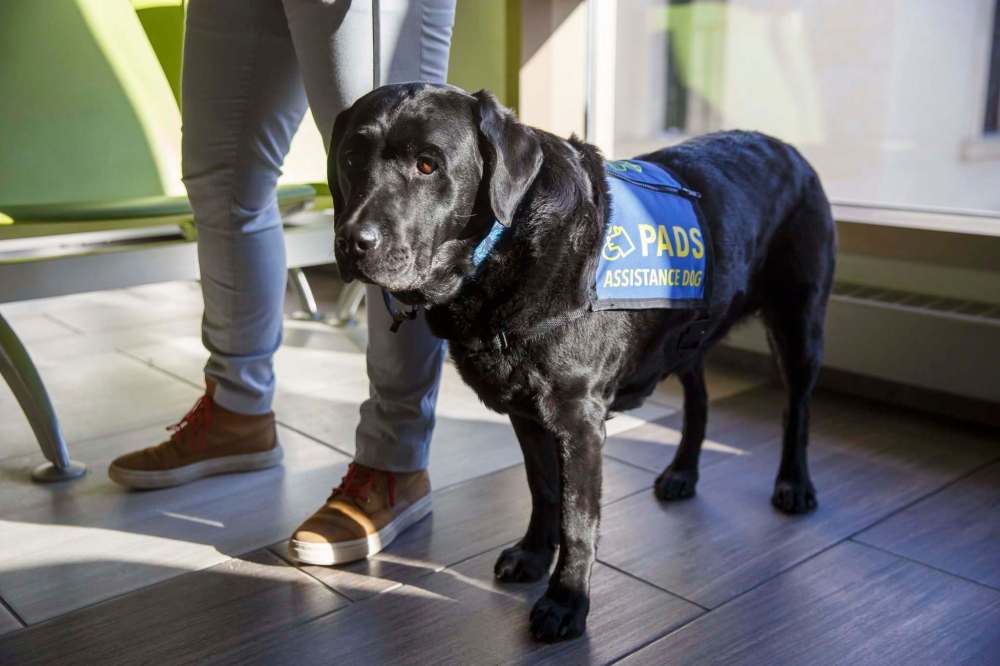
“It takes, I would say, a good three to six months to get used to having a 24/7 companion,” Bott says. “We live together, we work together, we’re together all the time.
“There would be times that I would wake up in the middle of the night and think, ‘Oh my God, did I leave her somewhere?’ “
Now, on the rare occasion she goes somewhere alone, Bott feels as if something is missing. She has also become accustomed to fielding questions about where her four-legged co-worker is.
“It’s all about Milan. I’m her accessory and it’s perfect.”
eva.wasney@freepress.mb.ca
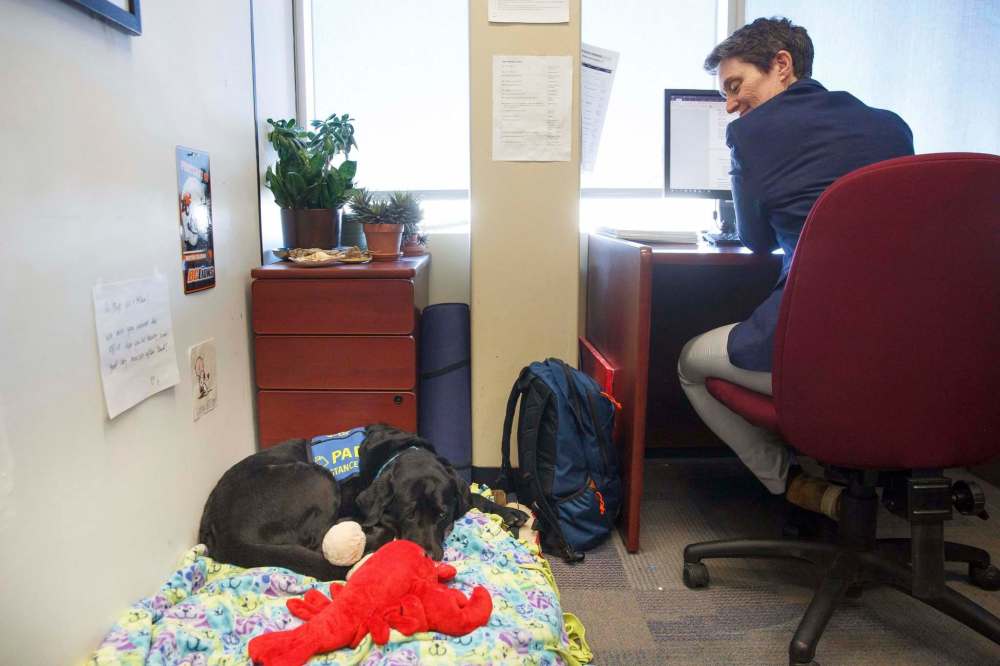
Twitter: @evawasney

Our newsroom depends on a growing audience of readers to power our journalism. If you are not a paid reader, please consider becoming a subscriber.
Our newsroom depends on its audience of readers to power our journalism. Thank you for your support.
History
Updated on Friday, February 28, 2020 1:13 PM CST: Clarifies assistance provided by Pacific Assistance Dogs Society





